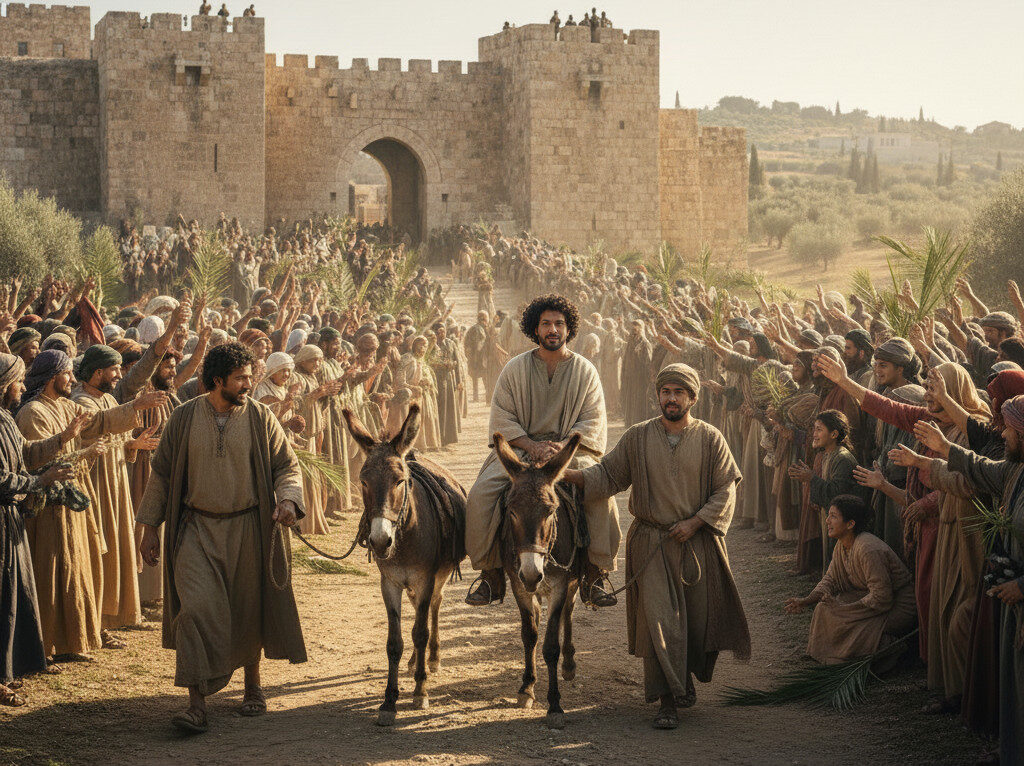Ezekiel 37:15-28 and Elements of God’s Future Promises to Israel
By Dr. Keith Kobelia / January 30, 2026
The Prophet Ezekiel was called to an unusual but important ministry to the captives of Judah in Babylon. Despite his unusual methods (e.g., symbolic acts) and extraordinary visions (e.g., Ezek...
Read More
Why the Promises to Israel Matter Today
By Dr. Daniel Brown / November 15, 2025
Fulfilled Messianic Prophecies from the Book of Zechariah
By Dr. Keith Kobelia / September 15, 2025
Among the most intriguing prophetic sections of the Bible are the prophecies of Zechariah which are contained in the book that bears his name. Zechariah is teeming with Messianic prophecies,...
Read More
The Virgin in Isaiah 7:14
By Dr. Timothy A. Little / July 1, 2025
INTRODUCTION According to the Gospel of Matthew, the virgin Mary was found to be with child of the Holy Spirit. Jesus the Messiah was miraculously conceived, and, several months later,...
Read More
1 Reply
{"slides_column":1,"slides_scroll":1,"dots":"true","arrows":"true","autoplay":"true","autoplay_interval":"5000","speed":"1200","lazyload":""}
Real Religion, Part 1
Posted on by Dr. Ernie Schmidt
The Faith Pulpit presents topics of interest to pastors and interested lay men and women. These two articles should especially benefit those ministering to ladies who have lost their husbands. Readers are welcome to photocopy these articles to make them more widely available. It is our prayer that Dr. Schmidt’s treatment of this vital subject will be a help and encouragement to you as you minister to others, particularly to widows.
The word religion usually makes Bible believers nervous. The word is usually associated with man’s attempt to earn God’s favor, but the New Testament does use it a few times in a positive way.
Reviewing Five Rapture Positions, Part 2
Posted on by Dr. Manfred Kober
IV. The Post-Tribulational View
The fourth view to be considered is the Post-Tribulational view, which teaches that the rapture and the second coming are aspects of a single event occurring at the end of the Tribulation period. Christ returns to the clouds, the church meets him in the air, and together they return to the earth. Perhaps the best known contemporary post-tribulational writer is Robert Gundry. His main argument is that, “Direct, unquestioned statements of Scripture that Jesus Christ will return after the tribulation and that the first resurrection will occur after the tribulation, coupled with the absence of statements placing similar events before the tribulation, make it natural to place the rapture of the Church after the tribulation” (The Church and the Tribulation, Grand Rapids: Zondervan Corporation.
Reviewing Five Rapture Positions, Part 1
Posted on by Dr. Manfred Kober
The rapture of the church is not an incidental but a fundamental doctrine of the New Testament. It is the greatest hope that Christ gave to the church. The biblical writers speak of it as a blessed hope (Tit 2:13), a purifying hope (1 Thess 4:18), a comforting hope (1 Thess 4:18) and a sure hope (2 Pet. 1:19).
Since there is much confusion among Christians concerning the rapture, the following study should be helpful in clarifying the subject. This article will briefly examine five views regarding the rapture, including each position, its proponents, supposed proofs, and any problems associated with each view.
The Relationship of Resurrection to Judgment
Posted on by Dr. Myron J. Houghton
It is not my intention to discuss all of the judgments that I believe Scripture describes. Nor is it my purpose to defend premillennialism, which is the belief that Christ will return to resurrect and glorify His saints and then set up a one thousand-year reign upon the earth. This article assumes that the premillennial view is correct. Premillennialism necessarily teaches two future resurrections—the resurrection of believers before the one thousand-year kingdom, and the resurrection of unbelievers following that kingdom. In this article I will demonstrate the inconsistency of affirming premillennialism, with its two distinct resurrections, while also affirming that there will be only one general judgment during which all humanity will stand and be judged.
Decide to Delegate (It’s the only way to make a disciple)
Posted on by Dr. Charles R. Phelps
Many ministers struggle with stress and the lack of ministerial fulfillment. I would like to suggest that one decision can provide the cure for both of these diseases. You must decide to delegate.
D. L. Moody said, “It’s better to get ten men to do the work than to do the work of ten men!” Moody’s sage advice is filled with scriptural wisdom. The Bible is filled with detailed descriptions of delegation. Solomon mastered the fine art of managing through men, and the kingdom was enlarged.
Prewrath Rapturism and the Day of Lord in the New Testament
Posted on by Dr. Alan D. Cole
The previous Faith Pulpit surveyed and analyzed three key Old Testament passages that the Prewrath Rapture View uses to support its understanding for the starting time (terminus a quo) for the Day of the Lord. This article will survey the key New Testament passages that are used by the Prewrath advocates, primarily Marvin J. Rosenthal and Robert D. Van Kampen.1
Matthew 24:36-39
The Prewrath argument from this passage is that the event described is the rapture, which follows the shortened tribulation period mentioned in verses 22 and 29.
Prewrath Rapturism and the Day of Lord in the Old Testament
Posted on by Dr. Alan D. Cole
Two previous Faith Pulpit articles have discussed the Prewrath Rapture View.1 According to this position, the seventieth week of Daniel (Dan 9:24) is divided into three sections: man’s wrath, which transpires from the beginning of the week until the middle of the week; Satan’s wrath (the Great Tribulation), which transpires from the midpoint of the week until some unknown time in the second half; and the Day of the Lord, which transpires from the close of the Great Tribulation until the thirty days after the seventieth week.
First Century Local Churches in Association, Part 2
Posted on by Dr. John Hartog, III
The previous issue of the Faith Pulpit pointed to ways that First Century local churches were associated by proximity, pattern, people, and practice. This issue will describe ways that First Century local churches were associated by purpose, project, and procedure.
Associated by Purpose
The Apostle Paul led groups of churches, like those in Macedonia and Achaia (Romans 15:26), to contribute money toward the relief of the saints in Judea—saints who had suffered persecution and famine (Acts 8:1; 11:28). The churches who participated in this venture were united by purpose, by project, and by procedure.
First Century Local Churches in Association, Part 1
Posted on by Dr. John Hartog, III
Introduction
The local church is “the house of God,” it is “the church of the living God,” and it is “the pillar and ground of the truth” (1 Timothy 3:15). The New Testament says much about the purpose of the local church and about its polity and practices. On the other hand, the New Testament does not say as much about multi-church, associational endeavors. Fundamental Baptists have historically, and rightly, emphasized the primacy, authority, and autonomy of the local church.
Nevertheless, although the New Testament says little about multi-church undertakings, it does say a few things.
Come Home Spot, Come Home—Deuteronomy 4:25–31
Posted on by Troy Dowden
My brother used to have a dog named Spot. Neighbors would come over to watch Spot use his front paws alone to hop down the back stairs. Spot would also pace around the backyard hoping to find an escape through the fence. He looked and looked every day to find his escape, wearing a dirt path in the yard along the fence. He probably thought that an escape would make him the happiest dog in the world. He finally did find the strength to dig a hole under the fence and accomplished his life’s goal—he escaped to freedom!



